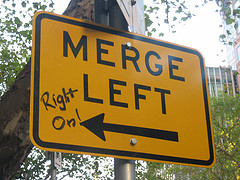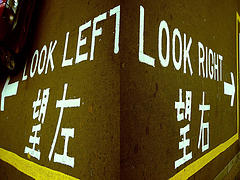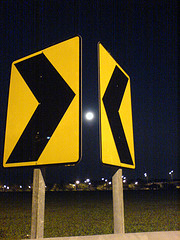Honton ko si kar dekhiye pachtaiye ga aap
Hangame jaag uthte hain aksar ghuttan ke baad
 Any anodyne effect this sher might have had on me was lost forever when my neo-Trotskyite friend decided to give me his interpretation of it. I didn’t ask for it, but there it was. A multi-headed hydra called “having coffee†– where the conversation starts off polite, turns to prittle-prattle , turns to poetry, turns to politics, turns to polemics, turns to punches. Lucky for me, he hits like a girl.
Any anodyne effect this sher might have had on me was lost forever when my neo-Trotskyite friend decided to give me his interpretation of it. I didn’t ask for it, but there it was. A multi-headed hydra called “having coffee†– where the conversation starts off polite, turns to prittle-prattle , turns to poetry, turns to politics, turns to polemics, turns to punches. Lucky for me, he hits like a girl.
“Religious extremism is the new communism,â€
he hissed, spraying spittle in all directions. I laughed. He carried on, unperturbed but passionate:
“The poor man has found his outlet – the injustice, the exploitation, the degradation, the desperation he’s suffered has found its expression. Islam, like communism, is based on egalitarian principles and promises them justice and equality. You think religious extremism has got anything to do with religion? It is nothing but the collective voice of a people who’ve been wronged their whole lives.â€
Somehow this gave me goose bumps and I quickly gulped down the latte in hope of thawing the chill his words left. It didn’t work and I got to thinking about Pakistan and Pakistanis everywhere.
Religious extremists in Pakistan can come from all walks of life but a sizeable chunk belongs to the poorer section of the society. Pakistani immigrants and expatriates living in the West also make up a significant portion. Why are these two groups more prone to religious extremism and terrorism? Was it that, time and again, they were discriminated against and shunted to silence? Did the exclusion leave such bitterness that it got bottled up inside for so long – so long that it is now, quite literally, exploding?
 In Pakistan’s context, the implication that religious extremism is connected to poverty and disfranchisement has been made not with a bang but a whimper (pun unintended). I think this concept needs to be forced to the fore. Many in the corridors of power are finding it convenient to ignore the ‘real’ reasons leading to Islamic radicalism, as that may point the j’accuse finger in their direction. But let’s briefly look at why a 19 year old Pakistani boy picks up a Kalashnikov or why a 37 year old father of three straps explosives around his waist.
In Pakistan’s context, the implication that religious extremism is connected to poverty and disfranchisement has been made not with a bang but a whimper (pun unintended). I think this concept needs to be forced to the fore. Many in the corridors of power are finding it convenient to ignore the ‘real’ reasons leading to Islamic radicalism, as that may point the j’accuse finger in their direction. But let’s briefly look at why a 19 year old Pakistani boy picks up a Kalashnikov or why a 37 year old father of three straps explosives around his waist.
It’s no secret that democratic institutions in Pakistan are in a frail state, if at all alive.
And then there is no Left or not much left of it. (The Communist Party of India could arguably be a good example of the importance of such a “balance of power†– on the domestic front at least.) In Pakistan very few avenues are open to the poor in need of some succour or just in need of voicing their distress. So, what happens? Under a dictatorship, and with no diversity of political parties to choose from, the poor, frustrated man turns to the radical Right – the Mullahs and their might.
Pakistani religious extremists living in the West dance to a slightly different tune. Feeling discriminated, displaced, alienated or plain confused – they crave to cling to a core, something that will anchor their sense of identity. Often times this comes in the form of religion. Sometimes its taken to an extreme. So, the religious radical turns to radicalism not out of a love for religion, but a deep hatred for those elements that he felt were unjust towards him (or his brethren.) Anti-Western sentiments do not transpire from Koranic verses, instead they’re born of the experiences one had in/of the West and the bitter taste that can leave in one’s mouth… body and soul.
 This is important. Scholars like Nichole Argo have accentuated the point: emotional and social ties precede the acquisition of ideology. Either our social situation has to be in the doldrums or our emotional condition so wounded that we take a religious ideology to an extreme. The media almost always portrays the religious extremist or terrorist as a gun-slinging gung-ho Islamist with a medieval mind and beard to boot. He is a dangerous, diehard jihadi on a mission to kill or be martyred trying. Such a description is like a donut-truth; the truth, the whole truth, with a hole in the truth (I forget what film this line is from). That hole is the real reasons people are pushed to accept a radicalised Islam, and these reason need to be better understood if we sincerely hope to curb extremism. Half-measures – like madrassa reformation – being implemented by our marginal-satisfiers might prove productive in that they’re broadening the narrow teachings of many religious seminaries. But they’re not preventing extremism. People, especially the poor and alienated, will continue to feel helpless in the face of a system they despise but can’t do anything to change. In fact, they may feel, and most do, that the measures being taken to tackle extremism are the spawn of the West, the very demon they wish to slay. So, they will continue feeling dejected and cheated. This inadvertently leads to the shift in their psyche that paves way for an extremist view.
This is important. Scholars like Nichole Argo have accentuated the point: emotional and social ties precede the acquisition of ideology. Either our social situation has to be in the doldrums or our emotional condition so wounded that we take a religious ideology to an extreme. The media almost always portrays the religious extremist or terrorist as a gun-slinging gung-ho Islamist with a medieval mind and beard to boot. He is a dangerous, diehard jihadi on a mission to kill or be martyred trying. Such a description is like a donut-truth; the truth, the whole truth, with a hole in the truth (I forget what film this line is from). That hole is the real reasons people are pushed to accept a radicalised Islam, and these reason need to be better understood if we sincerely hope to curb extremism. Half-measures – like madrassa reformation – being implemented by our marginal-satisfiers might prove productive in that they’re broadening the narrow teachings of many religious seminaries. But they’re not preventing extremism. People, especially the poor and alienated, will continue to feel helpless in the face of a system they despise but can’t do anything to change. In fact, they may feel, and most do, that the measures being taken to tackle extremism are the spawn of the West, the very demon they wish to slay. So, they will continue feeling dejected and cheated. This inadvertently leads to the shift in their psyche that paves way for an extremist view.
Some extremists may genuinely be harbouring a twisted interpretation of religion, and others may just be twisted by nature. But I believe that for most the acquisition of a radical religious ideology is triggered from a more fundamental feeling of victimisation, of feeling wronged, and/or being part of a harshly unjust system. In such cases religion offers unction, and a bandwagon-effect ensues whereby millions of disempowered and discriminated find a mouthpiece and meaning in the Right. Ironically, the factors thrusting them to the extreme right is born of leftist logic; an anti-establishment egalitarian cry for equal rights for the common citizen.
(How corrupt leaders exploit this feeling in the masses to further their own political interests is another matter. Also I would like to advise everyone to not turn this into a debate about Islam. It is about how the basic wrongs in society which cause an individual to adopt an extremist view, and how it is these wrongs that need to be focused if we wish to break free from the vicious cycle of militancy and dictatorship.)
Photo Credits: Flickr.com



















































I never insinuated extremism was of a single, religious, variety. Such a view is monochromatic and has been propagated for political reasons, and I believe the rhetoric needs be challenged. I even implied that ‘religion’ needs to be taken out of the equation when understanding this so-called ‘religious extremism’.
This also partly explains my reluctance to define ‘extremism’ because, the reasons propelling a suicide bomber to attack, the social context within which s/he is thinking and operating – these are reasons we don’t know much about and perhaps if we understood them, the suicide bombers actions would not seem so ‘extreme’ any more. Like the example someone gave earlier of the Palestinian, sick of the injustice and destitute of hope, blows himself up. He sees no other option. Again, its got little to do with religion. We need to understand the social context.
I also think words like ‘extremist’, ‘jihad’, etc have also played a part in creating that Islamic bogeyman you speak of. But that does not change the fact that individuals are committing suicide attacks or fighting under the banner of religion. For my part I’ve tried isolating religion from these ‘religiously-motivated’ acts by offering social explanations and looking at it from the ‘extremists’ perspective.
If I’m understanding you correctly, you’re suggesting that it is not that, nor is it religion, but instead they have a ‘clear strategic goal’ in mind – by extension, a goal of the ISI, for example? This echoes of my earlier post where I hinted that it is the system which has “sown these bad seeds” of extremism.
BUT, if an Agent walks up to you and says “go make me a nice Molotov cocktail and smash it against that building over there” would you just nod and get down to it? The question remains WHY that man or woman agrees to kill and die. I’ve argued the social/emotional factors push him or her to this ‘extremism’, but the bait is religion. S/he needs a banner to fight under, and religion is exploited to this end.
I’m unsure what you mean by ‘sin is in’ liberalism and how that has caused social upheaval, exploitation and injustice.
Well, Qandeel, Extremism certainly is NOT a single category
Well, Abid, WHAT is/are the key variable/s then? Why run-of-the-mill reproof without any solid argument of your own? Do not shirk from having a dialogue; my article is obviously not conclusive, its open to feedback and discussion. So kindly do not just disagree, but give me reasons WHY and perhaps your own counter-theory if you have one.
Ibrahim:
Since you brought up the issue of Ijtehad
It would be evident from the foregoing that some accusations against